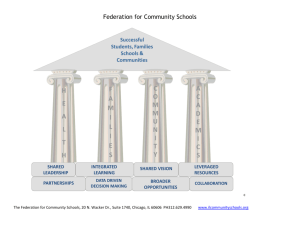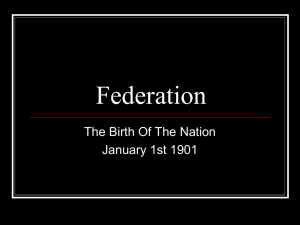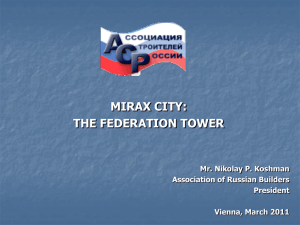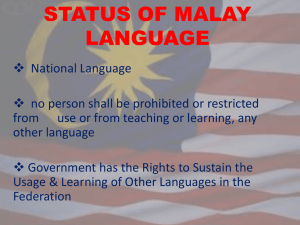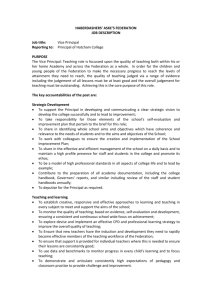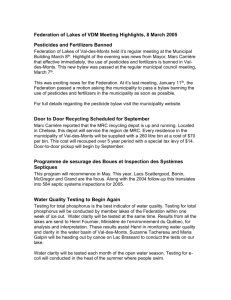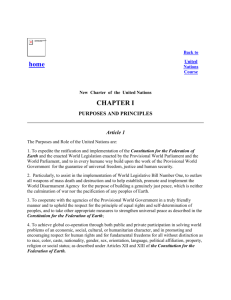Cambridge Theological Federation follow
advertisement
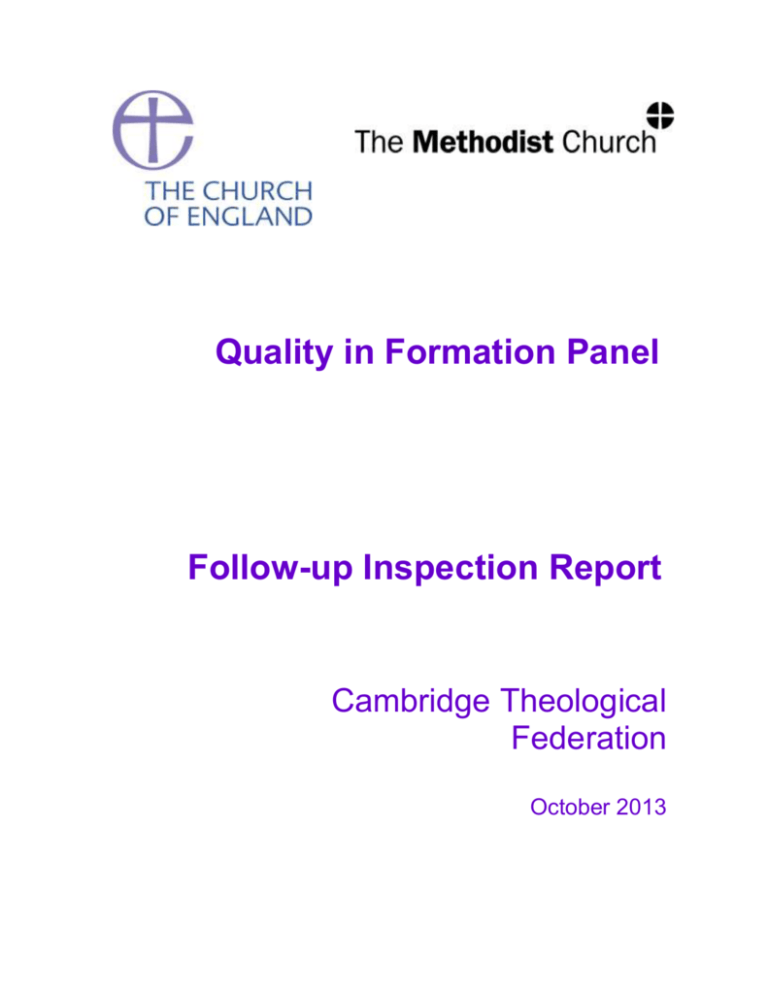
Quality in Formation Panel Follow-up Inspection Report Cambridge Theological Federation October 2013 Ministry Division Church House Great Smith Street London SW1P 3AZ Tel: 020 7898 1413 Fax: 020 7898 1421 Published 2013 by the Ministry Division of the Archbishops’ Council Copyright © The Archbishops’ Council 2013 2 Cambridge Theological Federation Senior Inspector’s follow-up Report on the Response by the Federation to the Recommendations of the November 2011 Report of the Inspectors October 2013 INTRODUCTION 1. I visited Cambridge on Friday 25th October 2013 and met Professor David Thompson, the Chairman of the Governing Council, Canon Martin Seeley, the Principal of Westcott House and current President of the Federation, and Rowena Small, the Registrar of the Federation. I am very grateful for the full and open way they responded to my various queries. 2. Since the Inspection, now nearly two years ago, there have been major nationwide changes to ministerial education for all the churches. Two stand out as critical. 3. The loss of funding for humanities courses from the Higher Education Funding Council, now almost complete, has forced the Federation and its member institutions to examine carefully all their financial commitments, considering what could be lost and what should be sustained as crucial core activities. This has led to a careful process of separating costs and examining how they are distributed. A reduction of staff within the Federation has led to some matters that were previously dealt with at Federation level now being dealt within the member institutions, for example the accreditation of prior learning and permission for late entries of essays. Also the financial model that applied to post graduate awards, which produced a modest financial surplus which accrued to the Federation, has now ended and this is but one example of the pressures that have led to a measure of financial realism being brought to bear on all the Federation’s work. It is hoped that such a process of reassessment will make this major funding change sustainable, but it is a matter still in process and it is too early to be sure of the final outcome. It has, though, been a factor in influencing one issue the Inspection noted about the fear of the Federation becoming over bureaucratic (Paragraph 70), and there has been a dramatic overhaul of the committee structure, with there now being fewer committees and a greater willingness when necessary to establish working groups with a limited life. 4. The second major change is the ending of the link by the Federation with Anglia Ruskin University in respect of under-graduate awards, still to be finally completed in 2014, and establishing the new relationship in common with all theological training institutions with Durham University. This is a complex process, leading inevitably to some hard questions on what is affordable, and there are matters still to be finally resolved during this academic year. Cambridge 3 University Divinity Faculty, for understandable reasons, has now become reluctant to allow students to attend lectures who are doing a course with another University, whether Anglia Ruskin or Durham, which is an example of the way the new funding regime is influencing the life of the Federation. Relations with Durham University are being developed and with the Federation having such a major role within theological education nationally there are grounds for cautious optimism, but much work still needs to be done to make this new relationship work well. 5. Two significant changes purely related to Cambridge have also had their effect. The review of the role of the Governing Council undertaken by Dame Mary Tanner has been completed and the specific issue mentioned in the Inspection Report (paragraph 71), the place of the Principals of the various member institutions on the Council, has now been resolved. Dame Mary recommended that their place on the Council should be retained and this has been accepted. She recommended the essential role of the Council to be the embodiment of, and hence responsible for, the ecumenical character of the Federation. 6. The main problem for the Governing Council is the maintenance of good and effective links with the Governing Bodies of the member institutions, many of which are denominational, and this has not always been straightforward. This can be seen as a further example of the parallels between what happens in the Federation and what happens in the European Union. All federations have their strengths and their difficulties. 7. The second major change within Cambridge is the Methodist Church’s decision regarding Wesley House for initial ministerial training, which may mean the end of a Methodist presence at ministerial formation level within the Federation. The Trustees of Wesley House are exploring a range of options for the future, which would maintain a Methodist presence within the Federation, and their final decision is expected in March 2014. Discussions are yet to be concluded and the financial implications will need to be carefully evaluated, but it would obviously be beneficial for the ecumenical character of the Federation to retain some sort of Methodist presence. 8. Turning to the specific recommendations of the Inspection Report, which follow in bold, the Federation has worked on all of the matters raised and their most recent comments, which incorporate what had been reported at earlier stages, follow each recommendation in italics. The comments of the Senior Inspector follow on for each recommendation. 4 Recommendation 1 We recommend that the issue of library security be reassessed in order to create a more secure environment. The Library Committee has analysed the books missing from Federation libraries and also undertaken research into how other theological college and academic libraries have tackled security. The Committee has produced a briefing paper with costed recommendations for action. This will be considered by the Resources Committee on 19 November 2013. In the meantime, the procedure for granting access to the Federation libraries in Cambridge has been tightened up, including training and advice for House staff who administer it. Funds have also been made available to pay a small honorarium to individuals acting as Library Assistants in each of the residential Houses. This increases the “staff” presence in each library and therefore reduces the amount of time during which they are unsupervised. The research undertaken by the Federation indicates that effective security of books is a common problem for all university and college libraries and short of having the Library open only when permanent staff are on duty or not allowing the borrowing of books at all it is difficult to see how the problem can be completely removed. The Federation has made commendable efforts to address the issue, but it is still too early to know exactly how effective these have been compared to the earlier situation that led to the Inspectors’ recommendation. Recommendation 2 We recommend that the Governing Council and Management Committee ensures that job descriptions are reviewed regularly, that the employee handbook is finalised, and that appraisals are done yearly with completed paper work. The Staffing & Remuneration Committee has substantially re-written the Staff Handbook and supporting HR policies. These are currently with the Federation’s HR advisors for comment. The Federation has also joined the “Your Employment Service” scheme offered by its advisors, which provides support, information and training in HR matters. Those job descriptions which were not revised for the Inspection have now been completed; those which were will be reviewed during Michaelmas Term 2013. A schedule for yearly appraisals has been drawn up and the subsequent paperwork is being completed in a more timely manner. This is a satisfactory response to the recommendation on the part of the Federation, although the delay by the Federation’s HR advisers to offer comments on the revised handbook and HR policies two years after the 5 inspection is unfortunate as it has the consequence that the handbook is still not finalised. This is outside the Federation’s control. Recommendation 3 The Governing Council and the Management Committee should review the premises for Federation staff and ensure they are adequate to perform the work required and enable a good working environment. The Federation offices were reviewed to ensure they complied with national standards. The layout in the shared offices has been changed to create more space between and around the desks. As a result of the forthcoming reconfiguration of the Wesley House site, the Federation offices will have to relocate in the summer of 2014. A discussion document outlining the various options available was presented to the Federation Management Committee on 7 October 2013, and a final decision is expected by the end of the month. The Management Committee has now agreed to move the offices to the Margaret Beaufort Institute of Theology. This seems a wholly satisfactory conclusion and is certainly acceptable to the present staff. Recommendation 4 We urgently recommend that the Governing Council and the Management Committee ensure the safety and well-being of the employees with regard to fire safety and the fire alarm at the Federation offices by further consultation with the House concerned. This work was completed during the summer of 2012. This is wholly satisfactory. Recommendation 5 We recommend that the Governing Council creates various medium to long term business plans that respond to the potential scenarios that might occur given the known changes in HE funding for the arts and humanities. The Resources Committee asked the Registrar to draft a three-year business plan. This was discussed by the Committee in Lent Term 2013 and forwarded to the Federation Management Committee in Easter Term 2013. The Management Committee set up a working party to take this work forward; its first report was discussed at the Management Committee meeting on 9 July 2013, when the working party was asked to undertake further work. At its meeting on 7 October 2013 the Management 6 Committee approved the general ‘direction of travel’ of the working party. The Registrar and President are now undertaking more detailed work on costings. Business planning will form a major agenda item at the Resources Committee meeting in November 2013. This is obviously a critical issue for the Federation given the new financial arrangements, and has understandably proved difficult, but there is a now a shared recognition that a long-term business plan must be developed and that reflects the practical realism with which the whole matter is being approached. Recommendation 6 We recommend that the Governing Council set up annual list of financial policies and practices which require regular review as part of its annual meeting programme. It is advisable that this be done for all policies which require annual or regular review. The Resources Committee drew up a list of policies and practices and recommended the following annual schedule of review and/or re-approval: Resources Committee to review all policies & procedures during Michaelmas Term and report to the January meeting of the Management Committee. This information will form the basis of a Management Committee report to the Governing Council at its March meeting. The annual schedule has been approved by the Management Committee and will come into effect in 2013/14. That all the policies are together in one document and will all be subject to annual review certainly meets the Inspectors’ concerns in this area. Recommendation 7 We recommend that the Governing Council set out a clear policy and practice of limits for purchase and for delegation of financial authority in this regard between the trustees and officers. These matters have been addressed in the policy document referred to under Recommendation 6 above. This too seems a wholly satisfactory outcome. Recommendation 8 We recommend that the Governing Council have three months reserve expenditure as soon as possible. 7 The Federation’s accounts for the 2012/13 financial year have not yet been audited, but early indications are that the reserves will be slightly in excess of three months’ expenditure. As some expenditure has already been cut three months reserves means in financial terms less than would have been the case when the Inspection Report was produced, but this is nonetheless a satisfactory outcome. Recommendation 9 We recommend that the Federation Governing Council continues to address the outstanding accommodation and updating issues with the colleges, including those places where the teaching space is inadequate, and pursues as a priority the fundraising strategy currently in place to help steer an effective refurbishment plan. To achieve this we recommend that the Federation Council should appoint someone with significant experience of estates and fundraising. The Governing Council has continued to give its full support to the fundraising and development initiatives of its member institutions. Westminster College’s development project is well under way and will result in the complete renewal of all of its teaching spaces. The purchase of their own premises by the Institute for Orthodox Christian Studies has added a further large teaching room to the Federation’s total and both Westcott and Ridley have undertaken work on their teaching facilities since the Inspection. A steering group, containing representatives of the Governing Council, Management Committee and member institutions, has been set up to negotiate the terms of what could become a substantial grant awarded to the Federation by a charitable trust. A new Independent member, with significant estates and financial expertise, was appointed to the Governing Council in March 2013, and a skills audit is being undertaken in anticipation of the departure of two of the Independent members of the Council in March 2014. Westminster College is close to raising the £7 million it needed for their major refurbishment and the work is well under way, while other member institutions of the Federation are actively developing their plans for refurbishment and development. The Federation and its constituent bodies are in good contact with major providers of grants, which bodes well, although it would be foolish not to recognise that the current economic climate does not make raising major sums of money easy. The newly appointed member of the Council with experience in this area is already having a positive effect and his presence provides some grounds for cautious optimism. 8 It is recognised that if a research component could be developed within the work of the Federation and its institutions it would enhance its relationship with its partner universities, and a possibility for a grant towards such a development is being actively pursued. The inspectors realised that this whole matter is long-term and no doubt the next inspection will want to see what progress has been made. Overall the Federation has responded very effectively to the Inspectors Report. ROBERT REISS The Revd Dr Robert Reiss, Senior Inspector 14 November 2013 9
